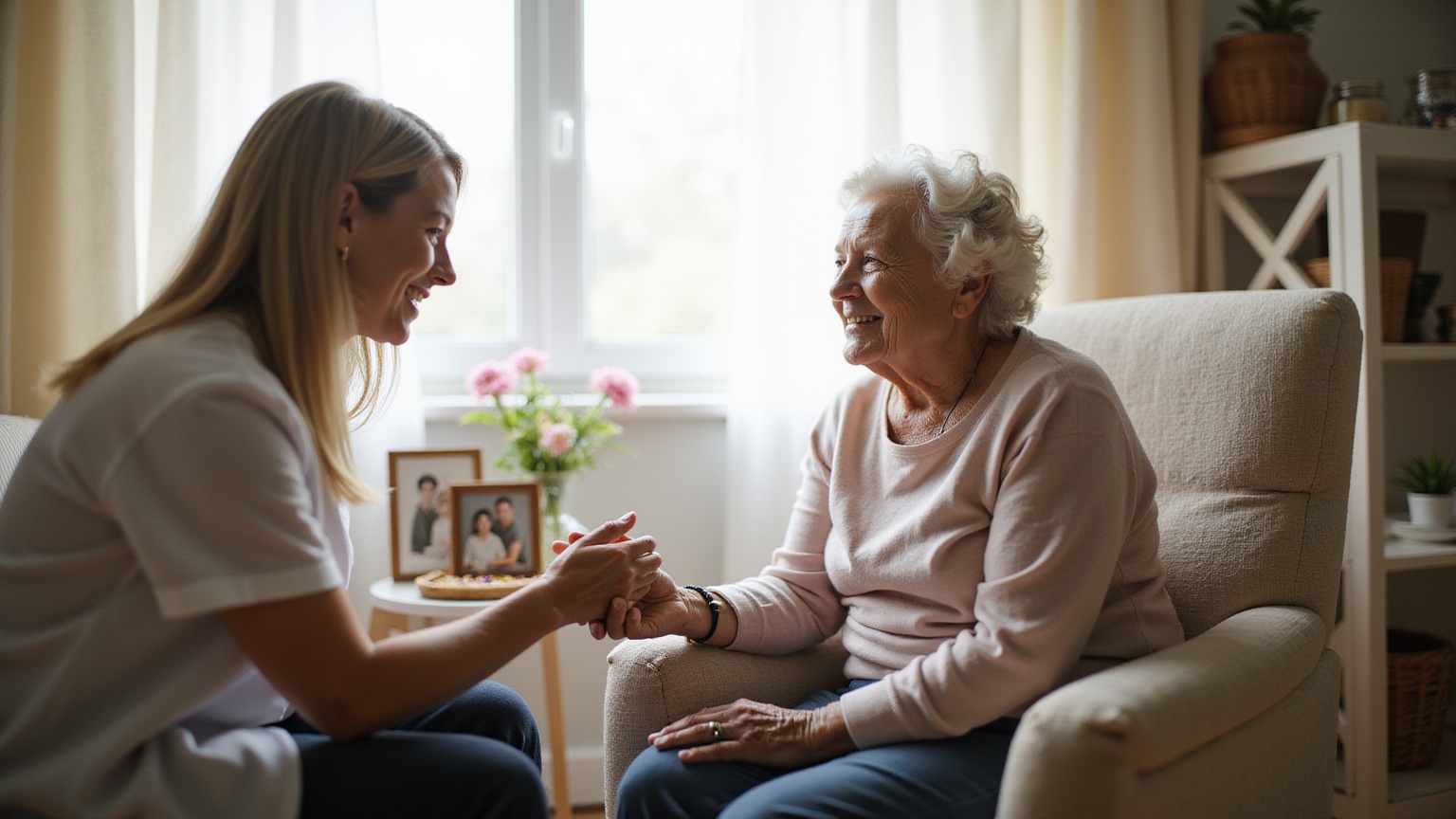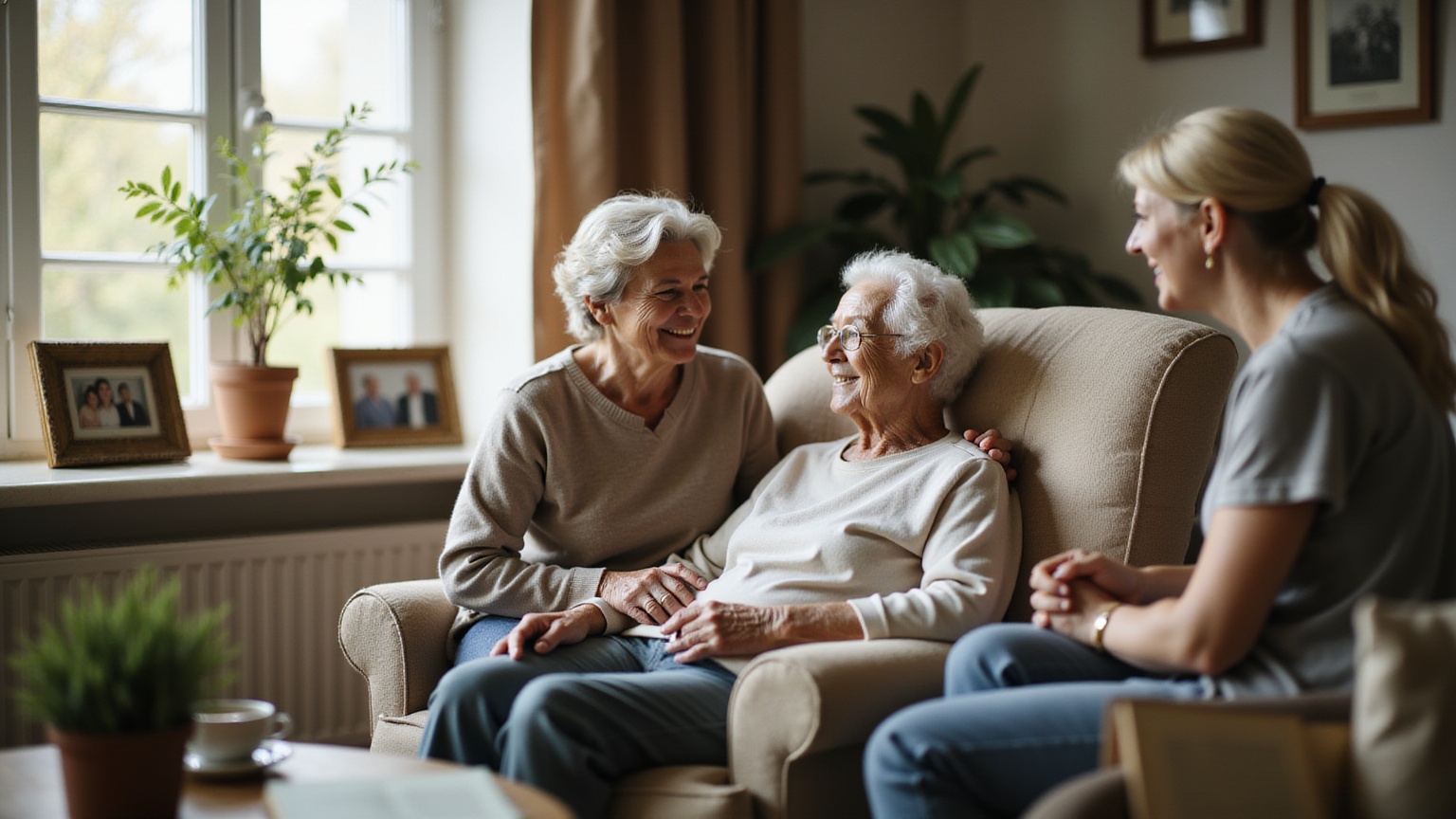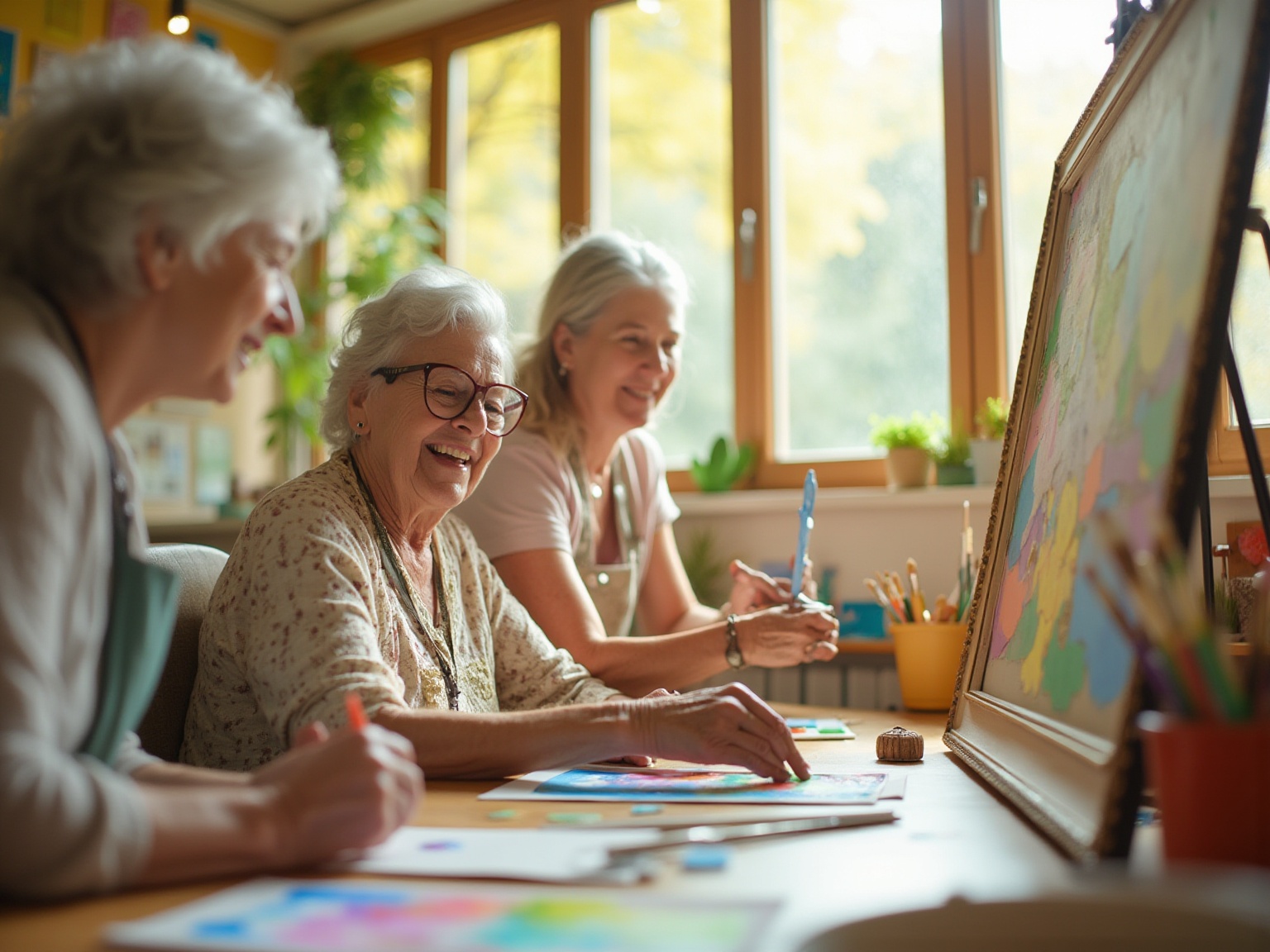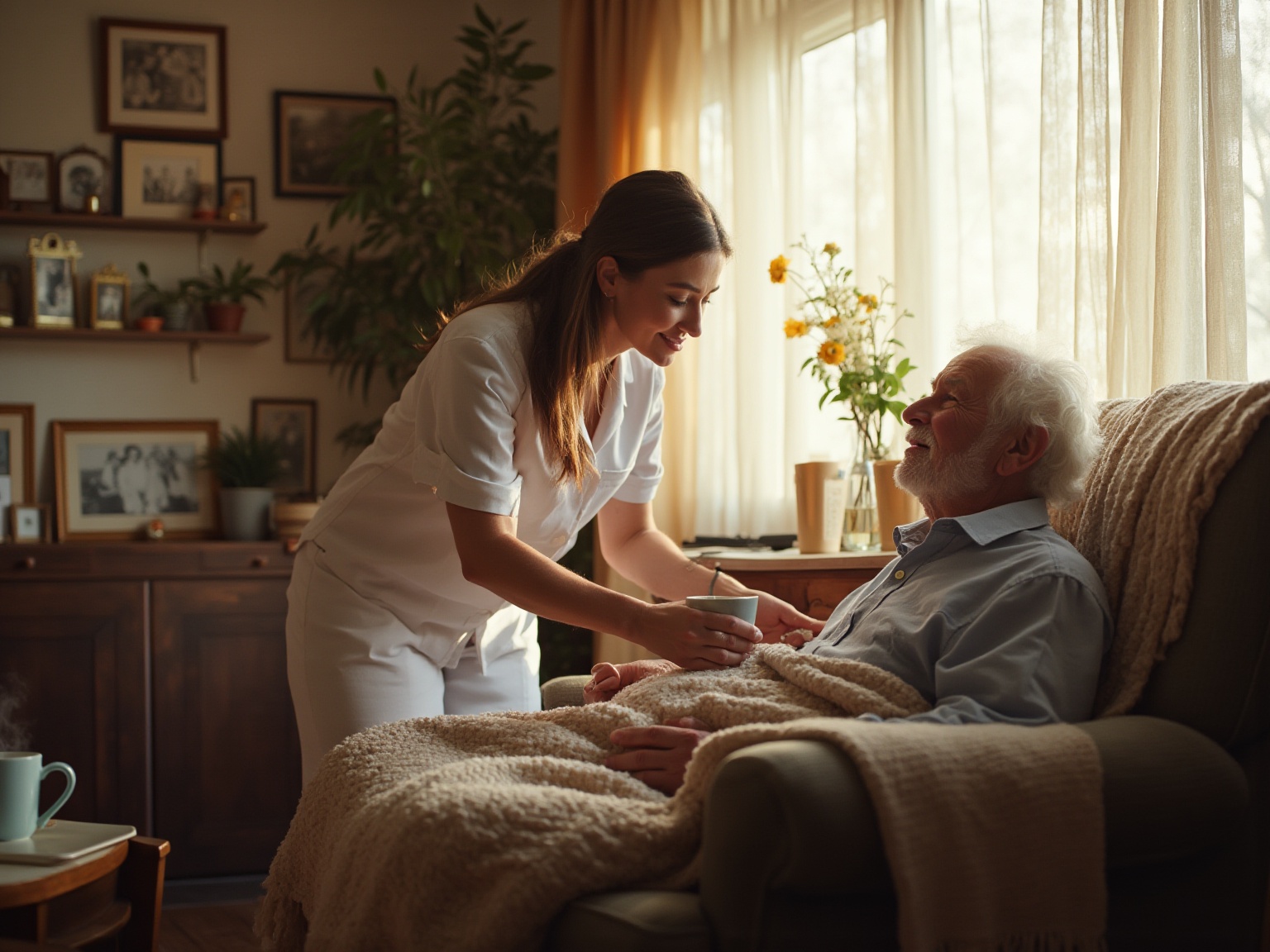Overview
Elderly home caregivers play a crucial role in supporting seniors, assisting with daily activities, providing companionship, and managing medication. This support is vital in helping maintain their independence and overall well-being. Caregivers not only deliver physical assistance but also foster emotional connections and create customized care plans. Their commitment highlights the essential role they play in enhancing the quality of life for elderly individuals.
In addition, caregivers understand the unique needs of each senior, ensuring that care is tailored to their individual circumstances. This personalized approach not only addresses physical needs but also nurtures emotional health, creating a holistic support system. As a result, seniors feel valued and understood, which can significantly improve their overall happiness.
We recognize that choosing the right caregiver is an important decision. Your comfort is our priority, and we are here for you every step of the way. By reaching out, you can find the compassionate support that your loved ones deserve, ensuring they receive the best possible care.
Introduction
In a world where the population of seniors is steadily increasing, the role of elderly home caregivers has become more crucial than ever. These dedicated professionals not only assist with daily activities but also provide companionship and emotional support, fostering a nurturing environment that enhances the well-being of seniors. As families navigate the complexities of care, understanding the responsibilities, skills, and challenges faced by caregivers is essential.
This article delves into the multifaceted world of elderly home care, highlighting the vital services offered, the necessary qualifications for caregivers, and the emotional and financial implications of this rewarding yet demanding profession. Through a comprehensive exploration of these themes, readers will gain valuable insights into the importance of choosing the right caregiver and the profound impact they have on the lives of their clients. We’re here for you, and your comfort is our priority.
Defining the Role of Elderly Home Caregivers
Elderly home caregivers play a vital role in supporting seniors as they navigate daily life. Their primary responsibilities encompass assisting with activities of daily living (ADLs) such as bathing, dressing, and meal preparation. Beyond these essential tasks, caregivers provide companionship and emotional support, which are crucial for maintaining mental health and overall well-being.
They also help with medication management, ensuring that seniors follow their prescribed regimens. By establishing a safe and supportive environment, caregivers enable seniors to maintain their independence while protecting their health. This relationship is not just about physical assistance; it involves fostering trust and understanding between caregivers and their clients. Caregivers frequently collaborate with families to create customized support strategies suited to the distinct requirements of each individual, ensuring that all aspects of the senior’s life are taken into account.
Home health services, like those offered by Best Care Nurses Registry, are more affordable, more convenient, and equally effective as assistance received in hospitals or nursing facilities. This is especially significant for seniors who might be residing alone, as recent statistics show that 31% of individuals receiving assistance who are not in assisted living or skilled nursing facilities live alone. The emotional burden of providing care is substantial; military individuals in this role, for example, report increased stress and anxiety, with 88% facing these difficulties.
This emphasizes the necessity for comprehensive support systems for caregivers themselves, as their well-being directly affects the quality of assistance they offer. The role of elderly home caregivers is increasingly acknowledged as vital in promoting seniors’ independence and improving their quality of life. Expert opinions emphasize that caregivers are not merely service providers; they are integral to the emotional and physical health of their clients. As noted by Peter S. Arno, PhD, the estimated value of family support providers’ services is $306 billion annually, further underscoring the importance of recognizing their contributions.
Successful client-provider relationships are characterized by mutual respect and understanding, which can lead to improved outcomes for seniors. As we progress through 2025, the significance of support providers in elderly assistance continues to increase, especially as technological innovations in health information technology seek to enhance access to services such as telemedicine. However, despite these advancements, only 6% of adults over 50 use transportation apps, indicating a gap in technology adoption that caregivers can help bridge.
By utilizing technology and nurturing strong connections, caregivers can greatly improve the daily living assistance they offer, ultimately aiding in the well-being and autonomy of the seniors they support.
If you or someone dear to you requires customized home health care services, we’re here for you. Reach out to Best Care Nurses Registry today at (888) 203-2529 to discuss your requirements and how we can help you.
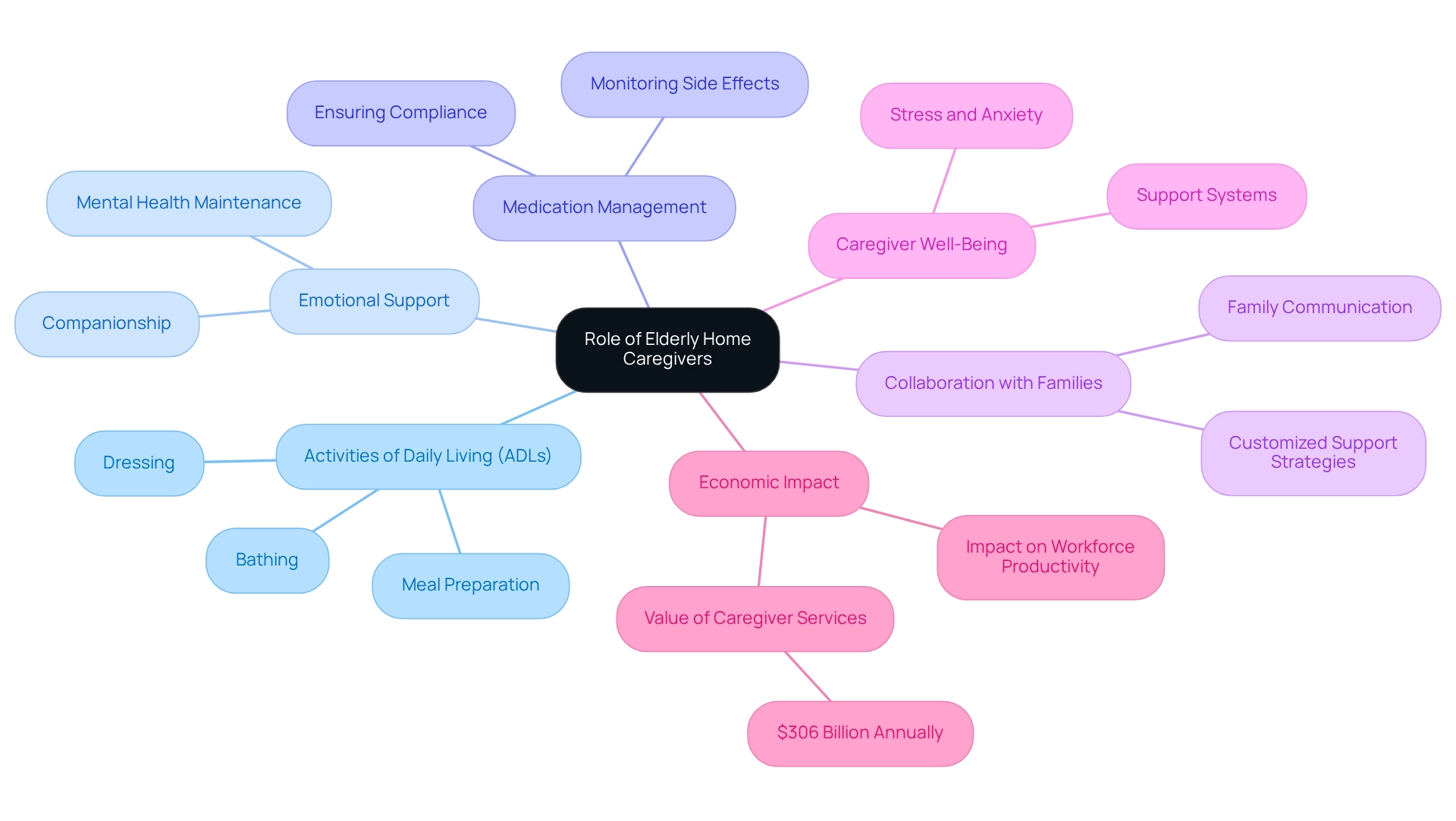
Types of Services Offered by Home Caregivers
At Best Care Nurses Registry, our elderly home caregivers provide a wide range of services specifically tailored to meet the unique needs of seniors, ensuring they can maintain their independence and quality of life. We understand the importance of compassionate care, and our key services include:
- Personal Care: Assistance with daily activities such as bathing, grooming, and dressing is essential for maintaining personal hygiene and dignity.
- Companionship: Our support providers offer emotional backing, engaging seniors in social activities that help combat feelings of loneliness and isolation.
- Meal Preparation: We plan and prepare nutritious meals tailored to dietary needs, promoting better health and well-being.
- Medication Management: Ensuring that medications are taken as prescribed is crucial for managing health conditions, and our support providers help seniors adhere to their medication schedules.
- Household Management: Light housekeeping, laundry, and grocery shopping are included to help maintain a clean and organized living environment.
- Transportation: Our support providers assist with transportation to appointments and errands, facilitating access to necessary services and social engagements.
These services can be customized to fit individual requirements, enabling our caregivers to provide the support seniors need in the comfort of their homes. The significance of individualized support is underscored by recent trends in home health services, which stress customized solutions that enhance the overall experience. For instance, a notable share of home health service income, valued at $8.6 billion in 2020, is linked to specialized offerings like physical therapy and occupational therapy, highlighting the rising need for extensive treatment alternatives.
Moreover, a study revealed that 85% of support providers assist relatives, emphasizing the family connections that often define caregiving dynamics. This dynamic underscores the importance for providers to comprehend the distinct needs of their clients, ensuring that assistance is not only effective but also compassionate and considerate of individual preferences. It’s also essential to recognize that 80% of veteran service recipients post 9/11 have a mobility-limiting disability, highlighting the particular needs of seniors facing mobility challenges.
As the realm of home support continues to evolve, we remain focused on the role of elderly home caregivers in delivering high-quality, tailored services that enable seniors to age in place comfortably and securely. In fact, 78 percent of patients indicated they would certainly recommend their elderly home caregivers at Best Care Nurses Registry to friends, reinforcing the quality of service we provide. Additionally, the trend of Population Health Management seeks to enhance health outcomes for groups by concentrating on delivering the finest service experience at the lowest cost, which resonates with the concerns of our target audience.
At Best Care Nurses Registry, we understand that many households have pets. Our services are pet-friendly, ensuring that your loved ones can receive assistance in an environment that includes their furry companions.
If you’re ready to explore how we can assist you or your loved one, please call us today at (888) 203-2529 to schedule a consultation. We invite you to listen to our satisfied clients who have experienced the compassionate support we offer, and allow us to help you in building a brighter future for your family.
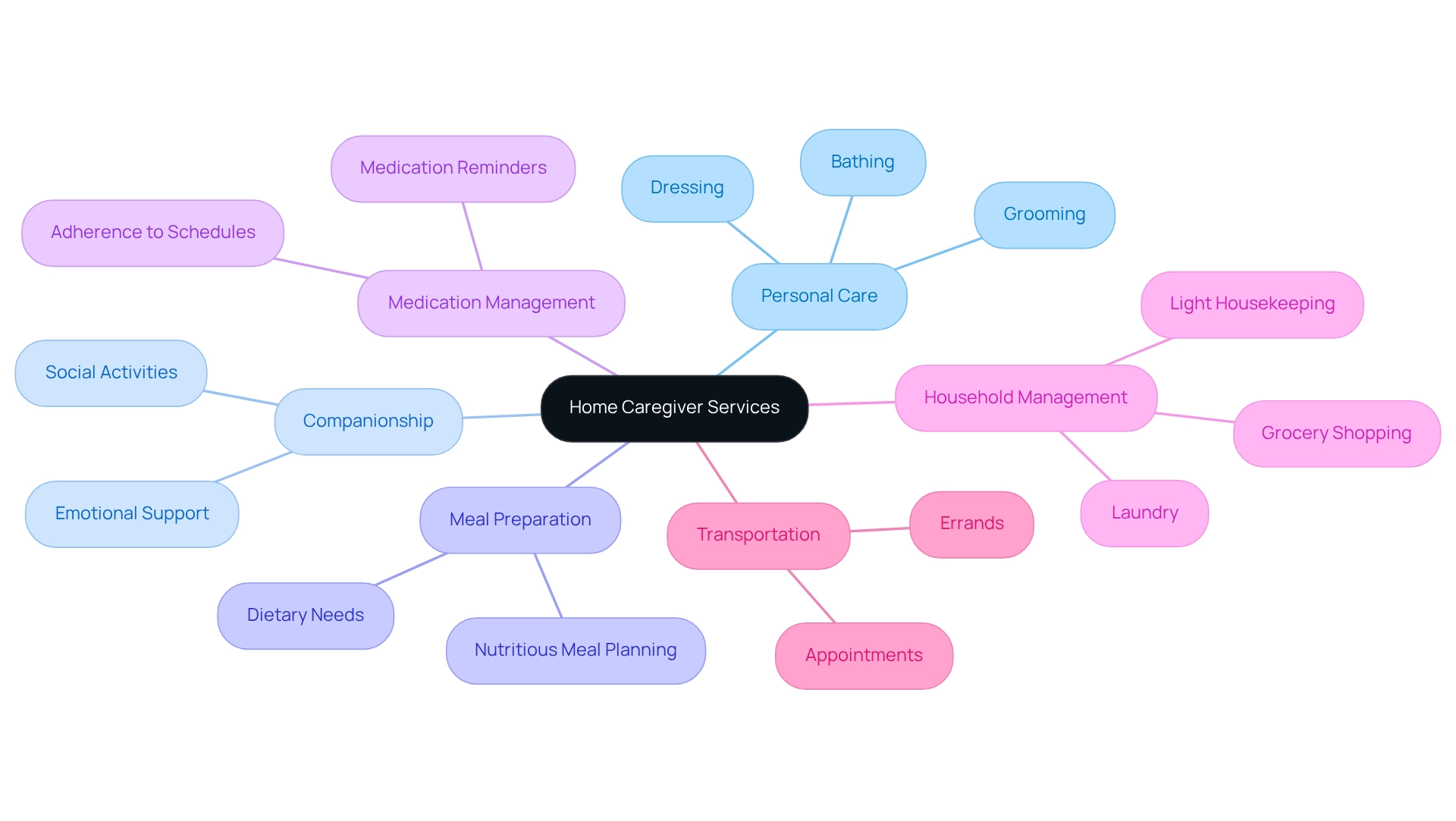
Essential Skills and Qualifications for Caregivers
To provide effective care for the elderly, caregivers must possess a diverse set of essential skills and qualifications, including:
- Compassion and Empathy: Caregivers need to understand and respond to the emotional needs of seniors, fostering a supportive environment that enhances their quality of life. This is particularly important as emotional support can alleviate feelings of loneliness and depression, contributing to mental and emotional health.
- Communication Skills: Effective communication is essential, allowing providers to convey important information clearly and listen attentively to clients’ concerns. Frequent updates and transparent communication with family members are essential for guaranteeing quality support.
- Basic Medical Knowledge: Understanding prevalent health issues and medication management is essential, enabling individuals to observe health changes and guarantee proper medication adherence. This knowledge is crucial for preventing health declines and managing chronic conditions effectively.
- Time Management: Caregivers must prioritize tasks efficiently to meet the various needs of their clients, ensuring that all aspects of care are addressed in a timely manner. This includes assistance with daily living activities such as bathing, grooming, and meal preparation.
- Physical Stamina: Assisting with mobility and performing physical tasks requires support providers to maintain a level of physical fitness that enables them to offer hands-on assistance, reducing the risk of falls and related injuries for seniors.
- Certification: Many providers hold certifications such as Certified Nursing Assistant (CNA) or Home Health Aide (HHA). These credentials necessitate formal education and assessment, guaranteeing that caregivers are equipped with the essential knowledge and abilities to deliver individualized support customized to the requirements of seniors.
Indicators suggesting the need for CNA/HHA services include difficulty with personal hygiene, dressing, cooking, cleaning, or managing medications. Health issues like managing chronic conditions, frequent hospital visits, or recent surgeries that necessitate ongoing support are also significant factors.
Statistics indicate that 52% of female elderly home caregivers earning at or below the national median income dedicate over 20 hours each week to offering support, underscoring the substantial commitment involved in this role. This statistic highlights the commitment needed from those providing care, who frequently juggle their own lives with the responsibilities of assistance. Moreover, the quotation, ‘The first rule of caregiving is to prioritize your own well-being first,’ emphasizes the significance of self-nurturing for those in this profession, which is a vital element of their responsibilities.
Case studies, such as ‘Elevating Alzheimer’s Care: The Role of Elderly Home Caregivers,’ demonstrate that well-trained elderly home caregivers can substantially improve the quality of life for patients, underscoring the importance of training and qualifications for those providing care. These insights emphasize the necessity for those providing care to be well-prepared and knowledgeable in their roles.
In 2025, essential skills for elderly support providers continue to evolve, with an emphasis on cultural competency to respect and accommodate the diverse backgrounds of clients. For example, those providing assistance should recognize cultural variations in communication methods, dietary choices, and health perspectives, ensuring they deliver support that is considerate and customized to each person’s requirements. Expert perspectives emphasize that those providing support must not only be skilled but also adaptable, ensuring they can address the unique requirements of each person they assist.
Without CNA/HHA services, seniors face several risks, including health decline due to lack of monitoring, poor nutrition from inadequate meal preparation, hygiene issues leading to infections, mobility challenges increasing fall risks, social isolation, household hazards, and medication mismanagement. These factors highlight the critical need for elderly home caregivers to provide professional caregiving that enhances the quality of life for seniors.
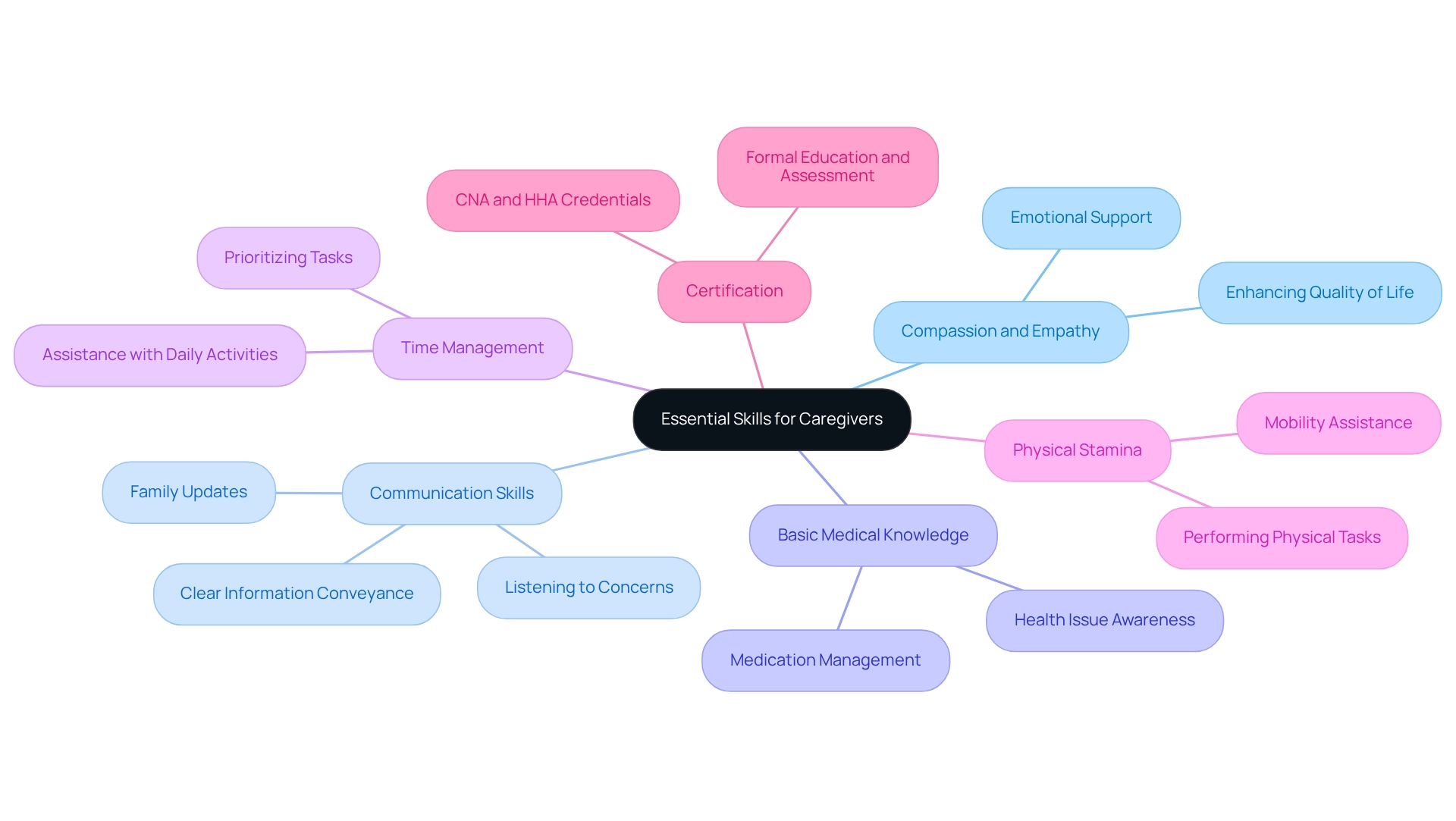
Challenges and Rewards of Being a Caregiver
Elderly home caregivers encounter a unique blend of challenges and rewards in their caregiving roles. Among the most significant challenges faced by caregivers are:
- Emotional Strain: The emotional demands of caregiving can lead to significant stress and burnout. Caregivers often grapple with feelings of anxiety and sadness, particularly when witnessing the decline of their loved ones.
- Physical Demands: Assisting seniors with mobility and daily activities can be physically taxing. Tasks such as lifting, transferring, and offering personal care demand significant strength and stamina, which can affect the health of those who provide assistance.
- Time Commitment: Many individuals in this role find themselves dedicating long hours to their responsibilities, which can disrupt their personal lives and lead to feelings of isolation.
Despite these challenges, elderly home caregivers discover that the rewards of caregiving are profound, providing a sense of purpose and fulfillment. Caregivers often report:
- Building Relationships: Developing meaningful connections with clients fosters a sense of companionship and trust, enriching both the caregiver’s and the client’s lives. CNAs and HHAs play a crucial role in this process, as their extensive daily contact with patients allows them to provide not only physical assistance but also emotional support.
- Making a Difference: Caregivers enhance the quality of life for seniors and their families, providing essential services that help maintain independence and dignity. As support provider Veronica Yepez expresses, ‘The rewarding part is knowing that we are all there for him.’
- Personal Growth: The experience of providing care can lead to significant personal development, as those who assist others acquire valuable skills in communication, problem-solving, and empathy.
As the senior population continues to grow, projections indicate that by 2034, seniors aged 65 and older will outnumber children under 18. The demand for elderly home caregivers will only increase. This demographic change, along with a reduction in the number of possible family supporters—projected to decrease from 7.1 available supporters per senior in 2010 to merely 4.1 by 2030—emphasizes the pressing need for creative solutions to assist both supporters and recipients of assistance.
Customized home assistance services, including CNA and HHA support from Best Care Nurses Registry, are crucial for elderly home caregivers to address these requirements. They help with daily tasks such as bathing, grooming, and meal preparation while providing companionship, reducing social isolation and enhancing emotional well-being. Community organizations are stepping in to alleviate the burden on those providing care by offering interventions such as respite care, skills training, support groups, and financial security measures.
These resources are essential in ensuring that those providing care receive the assistance necessary to flourish in their positions. Ultimately, while caregiving can be challenging, the profound impact caregivers have on the lives of seniors and their families makes it a deeply rewarding profession. We’re here for you—call (888) 203-2529 to schedule a call to discuss your needs.
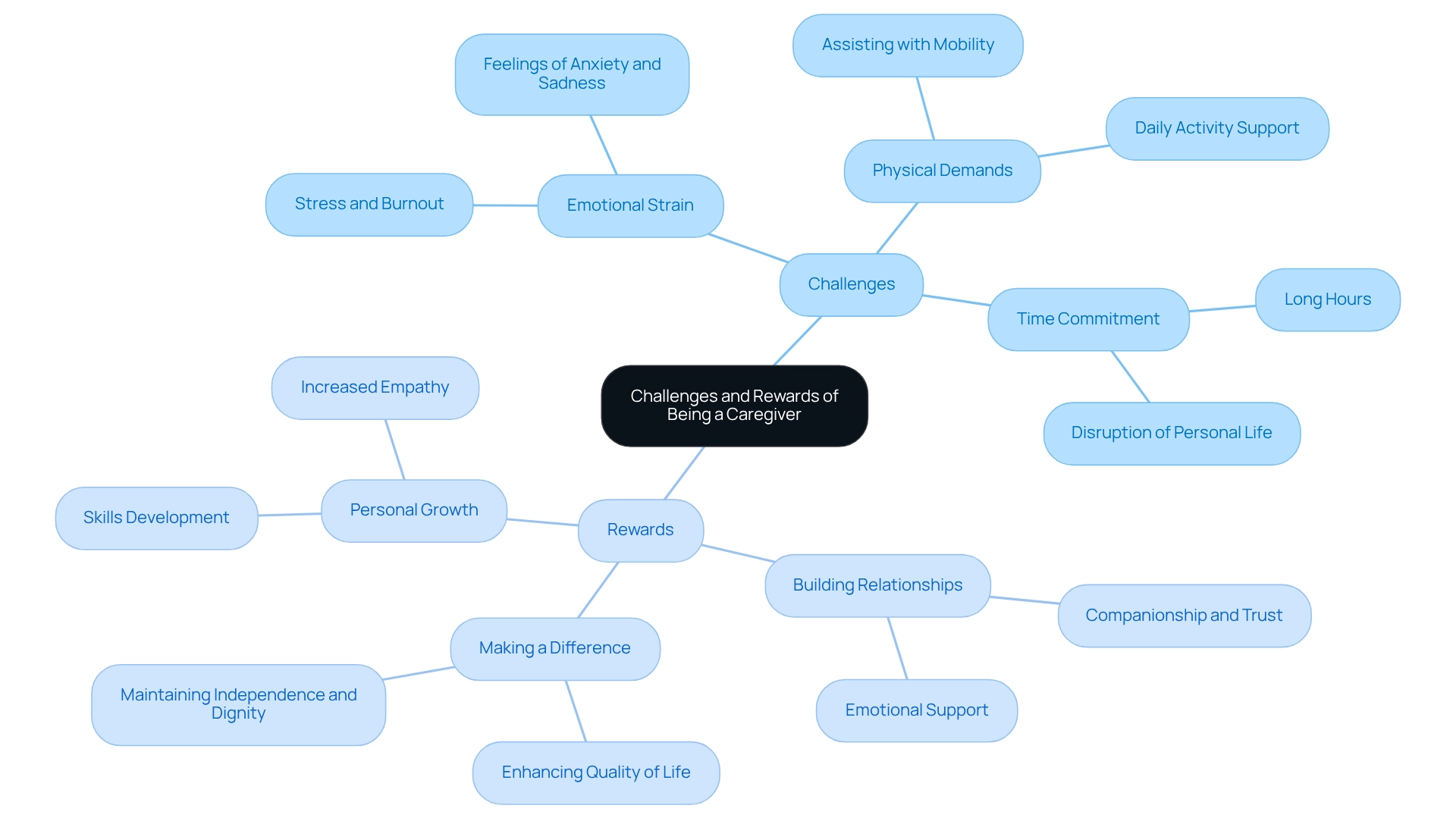
Legal and Ethical Considerations in Elderly Care
Elderly home caregivers and providers in the home health support sector play a vital role in ensuring the well-being of elderly clients, and they must comply with various legal and ethical standards. These standards are essential for fostering a compassionate and respectful caregiving environment.
- Informed Consent: It is crucial for caregivers to ensure that clients fully understand and agree to their care plans. This practice not only respects the autonomy of the individual but also aligns with legal requirements that protect clients’ rights. A recent study instrument composed of 46 items measured various issues related to the consenting process, highlighting the complexity and importance of informed consent in caregiving.
- Confidentiality: Protecting the privacy of clients’ personal and medical information is a fundamental ethical obligation. Elderly home caregivers must implement measures to safeguard sensitive data, thereby fostering trust and security in the caregiver-client relationship.
- Duty of Care: Caregivers are expected to deliver assistance that meets established standards, thereby avoiding negligence. This duty encompasses a commitment to delivering high-quality services that prioritize the health and safety of clients.
- Respect for Autonomy: Supporting clients’ rights to make their own choices regarding their treatment is paramount. Caregivers should encourage conversations that enable clients to share their preferences and options, especially in delicate circumstances like end-of-life support.
Families play a critical role in advocating for their loved ones by understanding these legal and ethical considerations. By being informed, they can ensure that their relatives receive care that is not only compassionate but also compliant with legal standards.
To evaluate if an elderly relative requires assistance from caregivers, families should assess their capacity to carry out daily activities and overall health condition. Indicators suggesting the need for these services include difficulty with personal hygiene, dressing, cooking, cleaning, or managing medications. Health issues like managing chronic conditions, frequent hospital visits, or recent surgeries that necessitate ongoing support are also significant factors.
Recent findings emphasize the necessity for ongoing education and clear communication strategies among elderly home caregivers to navigate the ethical and legal complexities involved in caring for older adults, particularly those with multiple health conditions. For example, case studies on end-of-life support highlight the difficulties that those providing assistance encounter in respecting advance directives, especially when family members might conflict with recorded preferences. These situations underscore the importance of clear communication and coordination among healthcare practitioners to respect patients’ wishes while addressing the legal implications of their decisions.
As of 2025, legal standards for senior support continue to evolve, necessitating that caregivers remain informed about current regulations and optimal methods. Expert insights from elder law attorneys emphasize that ‘comprehending the legal structure related to end-of-life assistance is crucial to prevent possible legal complications,’ highlighting the significance of legal awareness in caregiving. Furthermore, through the Best Care Concierge Program, clients have access to a network of professionals, including legal and financial specialists, which can greatly assist households in navigating the intricacies of support.
Best Care Nurses Registry also aims to enhance long-term support insurance advantages and provides various payment alternatives, which can further aid families in handling the financial elements of assistance. By following these ethical guidelines, providers can deliver the utmost quality of support, ensuring that clients’ rights and dignity are maintained.
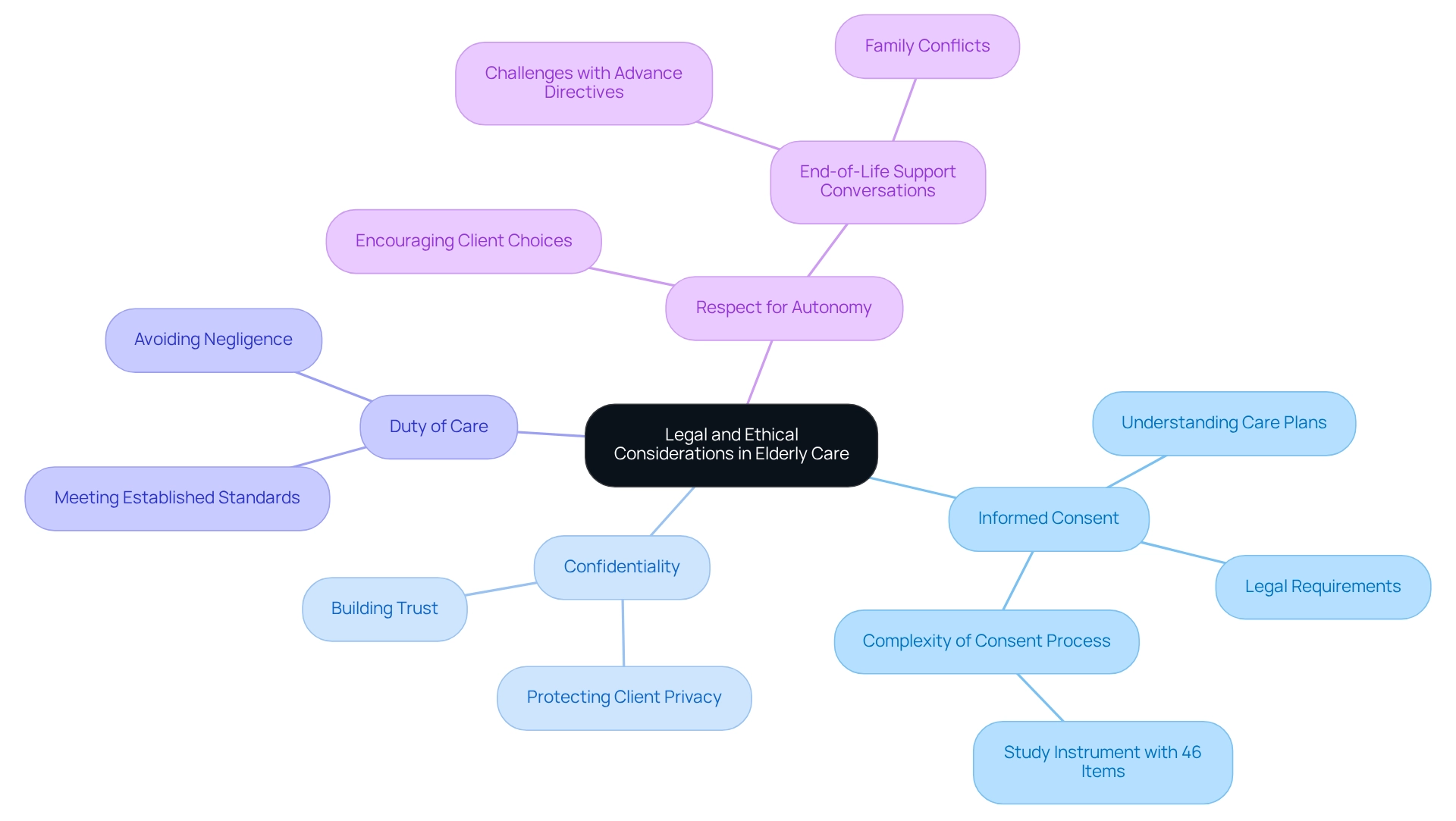
Financial Aspects of Elderly Home Care
The financial aspects of elderly home caregivers can vary significantly based on the services provided and geographical location. Understanding these factors is crucial for families navigating this important decision.
Hourly Rates: The average hourly rates for caregivers typically range from $20 to $35, influenced by experience, qualifications, and specific services rendered. In some regions, these rates may be higher due to demand and cost of living. Notably, New York ranks number 50 out of 50 states for home caregivers’ salaries, highlighting significant regional disparities that can affect your choices.
Payment Options: Families have multiple payment methods to evaluate, including private pay, long-term support insurance, and Medicaid. Comprehending these choices is essential, as they can greatly influence the overall affordability of services. Many households are progressively exploring ways to enhance their long-term insurance advantages to reduce financial hardships. As Vicki Demirozu, a home support specialist, highlights, “Planning for long-term assistance is crucial, and households should begin budgeting as early as they can to prepare for both present and future requirements.”
Budgeting for Care: It is vital for families to assess their financial situation and plan for ongoing care costs, which can accumulate over time. A comprehensive budget should consider not only hourly rates but also potential additional expenses such as transportation, medical supplies, and support worker benefits. For example, a case study titled “Additional Considerations for Caregiver Compensation” discusses factors beyond base salary that affect caregiver compensation, including healthcare coverage and paid time off, which can influence overall costs and should be factored into budgeting decisions.
Expert Insights: Financial advisors emphasize the significance of early planning for long-term assistance. They suggest that households begin budgeting at the earliest opportunity, considering both present and future requirements. This proactive strategy can assist in alleviating the financial burden linked to unforeseen support needs. Additionally, the Best Care Concierge Program offers access to a network of professionals, including financial advisors, who can provide tailored guidance on navigating these financial complexities. This comprehensive assistance ensures households are well-equipped to make informed choices about their loved ones’ well-being.
By grasping these financial elements, families can make educated choices regarding the assistance their loved ones receive. We’re here for you, ensuring that you select options that correspond with your financial means while still delivering high-quality support.
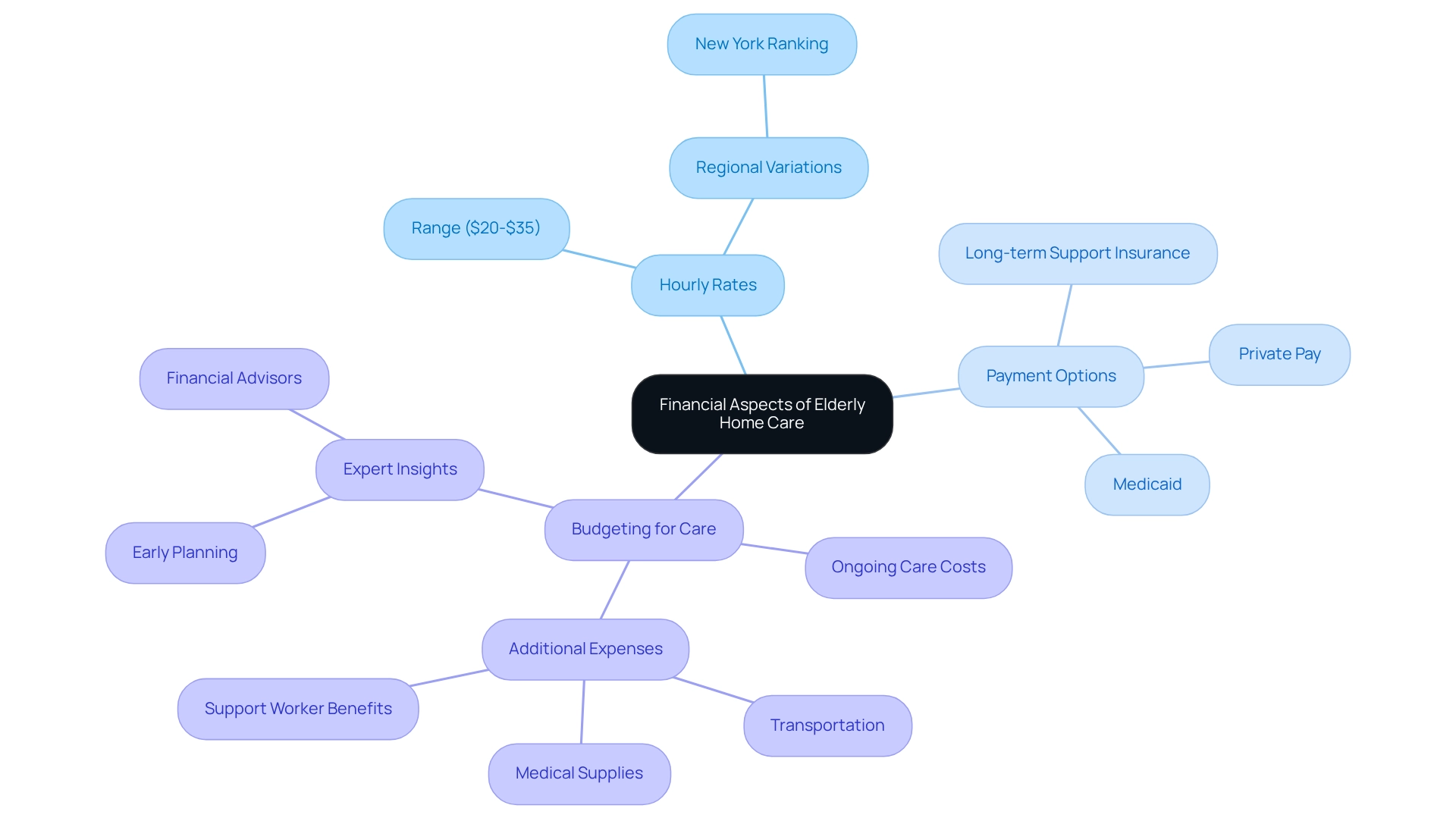
Choosing the Right Caregiver for Your Loved One
Selecting the right provider for your loved one is a crucial process that involves several important steps:
-
Evaluate Requirements: Begin by recognizing the specific needs of your loved one. This includes understanding their medical requirements, personal preferences, and any special considerations that may affect their daily living. Signs that suggest the need for CNA/HHA support services include challenges with personal hygiene, dressing, cooking, cleaning, or managing medications, as well as health concerns like chronic conditions or recent surgeries, all of which may require assistance from elderly home caregivers.
-
Research Options: Explore reputable home support agencies, such as Best Care Nurses Registry, or independent providers. Seek those with positive reviews, verified credentials, and a strong community reputation. This foundational research is essential for ensuring quality service. Families often look for reliable elderly home caregivers, considering factors like experience, qualifications, and personalized care strategies.
-
Interview Candidates: Conduct thorough interviews with prospective providers. This is an opportunity to assess compatibility, evaluate their experience, and understand their communication styles. Engaging in open conversation can reveal how effectively they may relate to your loved one.
-
Check References: Always verify the professional’s background by reviewing references and past client experiences. This step helps confirm that elderly home caregivers have a proven track record of reliability and compassion.
-
Trial Period: Consider implementing a trial period with the chosen provider. This allows both the caregiver and your loved one to adjust and determine if the match is suitable. A trial can help identify any potential issues early, promoting a smoother transition.
Research indicates that the choice of elderly home caregivers significantly affects emotional well-being, underscoring the importance of a good match for both caregivers and recipients. For example, a case study examining the hours dedicated to caregiving by age revealed that older individuals in this role, especially those caring for spouses, often face increased demands, complicating their responsibilities. Additionally, statistics show that 38% of veteran support recipients post 9/11 meet criteria for probable depression, highlighting the emotional challenges faced by both providers and recipients.
Moreover, a study utilizing SPSS software to explore the relationship between support provider selection and stress emphasizes the significance of choosing the right individual. By following these steps, families can find elderly home caregivers who not only meet their loved one’s needs but also cultivate a trusting and supportive relationship, ultimately enhancing the quality of care and satisfaction for everyone involved. As noted by the National Alliance for Caregiving and AARP, 47% of caregivers have an annual household income of less than $50,000, which may influence their selection process.
This financial context is crucial in understanding the dynamics of support provider choice. To ensure tailored home health services, reach out to Best Care Nurses Registry today. We’re here to help you find the right provider for your loved one, because your comfort is our priority.
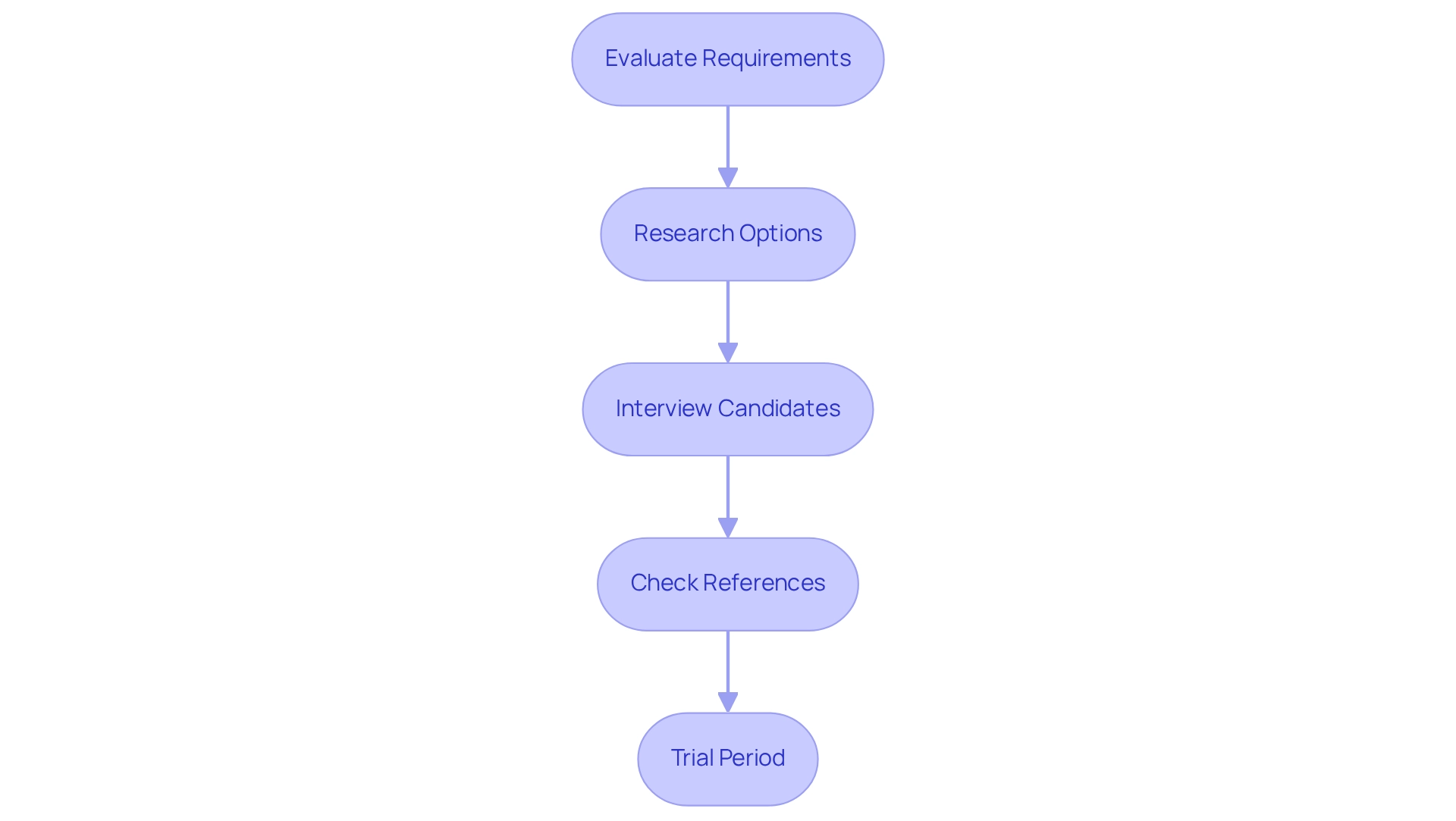
Effective Communication Between Caregivers and Families
Efficient communication between elderly home caregivers and relatives is essential for successful caregiving, especially when considering the need for CNA/HHA caregiver services. Implementing key strategies can significantly enhance the quality of care provided to seniors:
- Regular Updates: Caregivers should consistently provide families with updates regarding the senior’s condition and progress in care. This approach not only keeps households informed but also nurtures trust and openness, which is crucial when evaluating the need for continuous support.
- Open Dialogue: Promoting transparent conversations regarding any concerns or changes in support needs is vital. This approach allows families to voice their thoughts and ensures that caregivers are aware of any evolving requirements, particularly in light of health concerns that may necessitate additional support.
- Involvement in Support Plans: Families should actively engage in creating and modifying support plans. This participation guarantees that the preferences and requirements of their loved ones are prioritized, resulting in more tailored support that addresses daily living activities and medical tasks.
- Utilizing Technology: Leveraging communication tools or apps can facilitate ongoing dialogue and information sharing. These technologies can close gaps in communication, fostering connections between households and those providing assistance while overseeing the support being given.
To determine if an elderly relative requires the assistance of caregivers, individuals should evaluate indicators such as difficulty with personal hygiene, dressing, cooking, cleaning, or managing medications. Health concerns like managing chronic conditions, frequent hospitalizations, or recent surgeries that require ongoing care are also critical factors for elderly home caregivers.
Studies show that efficient communication techniques can lead to better caregiving results, enhancing both the emotional health of seniors and the overall satisfaction of relatives. For instance, a case study named ‘Enhancing Well-being through Nutritious Home Cooking for Seniors’ emphasizes how regular updates and involvement from relatives can significantly affect health and quality of life. The research highlights that adequate nutrition is essential for preserving health, and effective communication plays a crucial role in ensuring that households are aware of dietary requirements and preferences.
Furthermore, statistics indicate that the significance level for effective communication strategies is defined as < 0.05, illustrating a strong correlation between communication and positive caregiving outcomes. Doreen Reifegerste notes, “This work was financially supported by the Federal Institute for Risk Assessment, Berlin, Germany,” underscoring the importance of structured communication in caregiving.
It is also crucial to consider HIPAA compliance responsibilities regarding communication between health providers and relatives. Maintaining trust and confidentiality is critical in caregiving relationships, and adhering to these regulations ensures that sensitive information is handled appropriately.
By promoting efficient communication, relatives and caregivers can collaborate more effectively, ensuring that seniors receive the highest quality support tailored to their individual needs. This collaboration is especially significant when exploring long-term care insurance options, as individuals can gain a clearer understanding of what services are included and how to initiate care without immediate out-of-pocket costs. Best Care Nurses Registry accepts most Long Term Care insurances directly on your behalf, assisting families in understanding their coverage and facilitating the payment process.
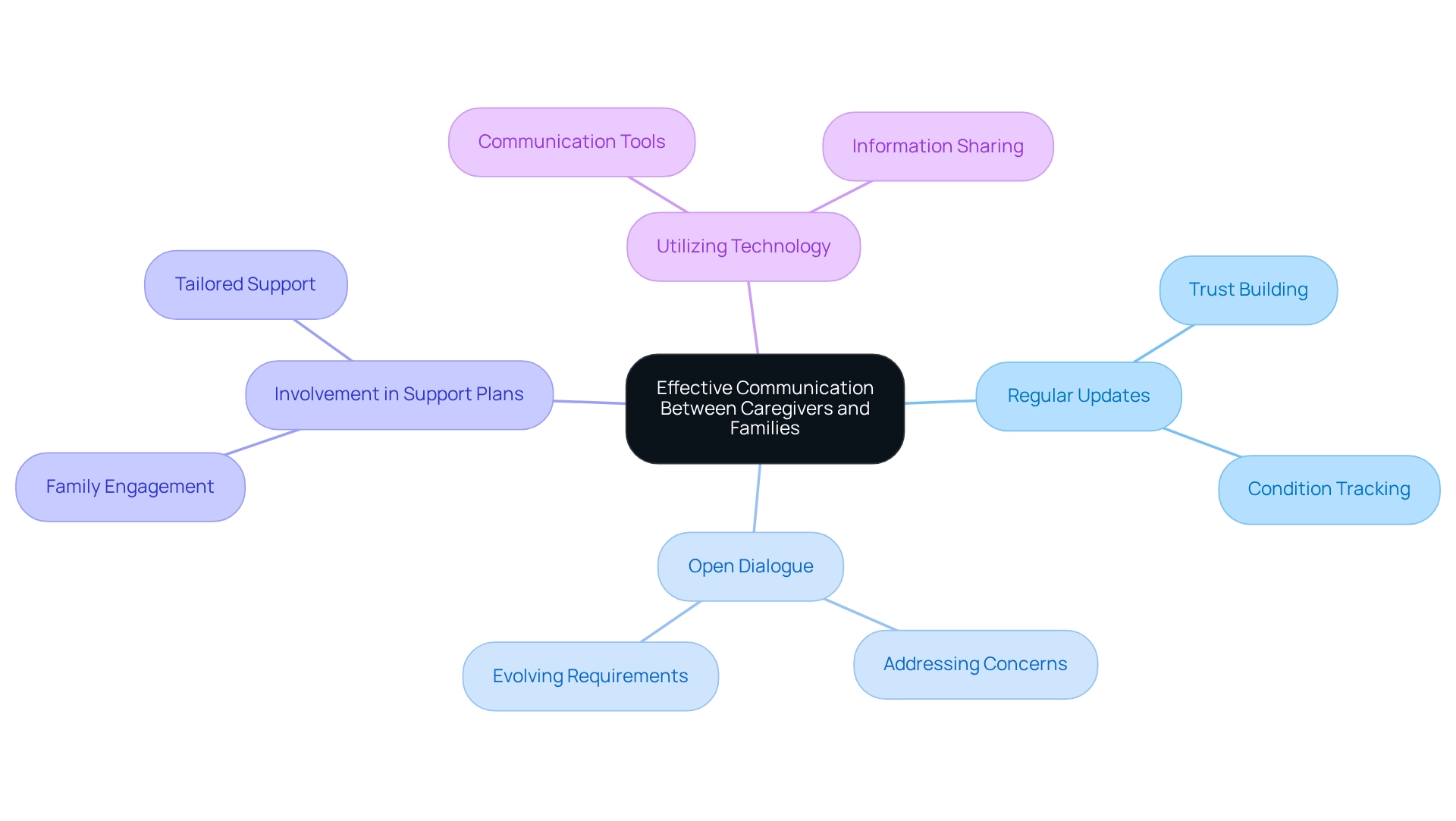
Conclusion
The significance of elderly home caregivers in today’s society cannot be overstated. They play an essential role in supporting seniors by assisting with daily activities, providing companionship, and managing health-related tasks. This multifaceted approach not only helps seniors maintain their independence but also enhances their quality of life. Therefore, selecting the right caregiver is a critical decision for families.
Understanding the range of services offered, the necessary qualifications, and the emotional and financial implications of caregiving is crucial for families navigating this journey. Caregivers must possess a blend of compassion, communication skills, and medical knowledge to effectively meet the diverse needs of their clients. While the role can be demanding, the rewards—such as building meaningful relationships and positively impacting seniors’ lives—are profound and fulfilling.
As the population of seniors continues to grow, the demand for quality caregiving services will only increase. Families must proactively assess their loved ones’ needs, research caregiver options, and engage in open communication to ensure the best care tailored to individual circumstances. With the right support and resources, caregivers can thrive in their roles, ultimately creating a nurturing environment that enhances the well-being of seniors.
In summary, choosing the right caregiver is not just about meeting physical needs; it’s about fostering a supportive and compassionate relationship that significantly impacts the emotional and mental well-being of seniors. The journey of caregiving, while challenging, is filled with opportunities for connection and growth. Together, we can make this vital aspect of elder care in our communities a source of strength and comfort.
Frequently Asked Questions
What are the primary responsibilities of elderly home caregivers?
Elderly home caregivers assist with activities of daily living (ADLs) such as bathing, dressing, and meal preparation. They also provide companionship, emotional support, medication management, and help create a safe environment for seniors.
How do caregivers support the emotional well-being of seniors?
Caregivers offer companionship and engage seniors in social activities, which helps combat feelings of loneliness and isolation, contributing to better mental health and overall well-being.
What role do caregivers play in medication management for seniors?
Caregivers help ensure that seniors follow their prescribed medication regimens, which is crucial for managing health conditions effectively.
How do caregivers customize their support for individual seniors?
Caregivers collaborate with families to create tailored support strategies that address the unique needs of each senior, taking into account all aspects of their lives.
What are the advantages of home health services compared to hospital or nursing facility care?
Home health services are more affordable, convenient, and equally effective as care received in hospitals or nursing facilities, particularly for seniors living alone.
What challenges do caregivers face in their role?
Caregivers often experience significant emotional burdens, with many reporting increased stress and anxiety, highlighting the need for support systems to ensure their well-being.
How do caregivers contribute to the independence of seniors?
By providing essential daily living assistance and emotional support, caregivers enable seniors to maintain their independence while ensuring their health and safety.
What specific services are offered by Best Care Nurses Registry?
Services include personal care, companionship, meal preparation, medication management, household management, and transportation assistance, all tailored to meet individual needs.
How important is technology in the role of caregivers?
Technology can enhance the assistance caregivers provide, helping to bridge gaps in service access, especially as innovations in health information technology evolve.
What is the significance of individualized support in home health services?
Individualized support enhances the overall experience for seniors, ensuring that care is effective, compassionate, and considerate of their personal preferences and needs.

